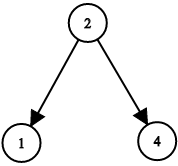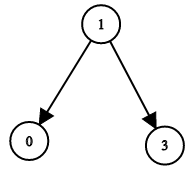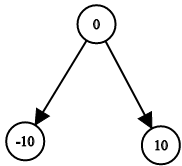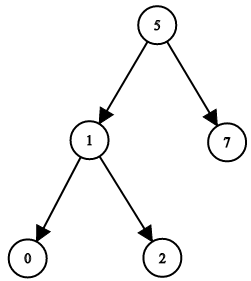Given the roots of two binary search trees, root1 and root2, return true if and only if there is a node in the first tree and a node in the second tree whose values sum up to a given integer target.
Example 1:
Input: root1 = [2,1,4], root2 = [1,0,3], target = 5 Output: true Explanation: 2 and 3 sum up to 5.
Example 2:
Input: root1 = [0,-10,10], root2 = [5,1,7,0,2], target = 18 Output: false
Constraints:
- The number of nodes in each tree is in the range
[1, 5000]. -109 <= Node.val, target <= 109
# Definition for a binary tree node.
# class TreeNode:
# def __init__(self, val=0, left=None, right=None):
# self.val = val
# self.left = left
# self.right = right
class Solution:
def twoSumBSTs(self, root1: TreeNode, root2: TreeNode, target: int) -> bool:
vals1, vals2 = [], []
def inorder(root, vals):
if root:
inorder(root.left, vals)
vals.append(root.val)
inorder(root.right, vals)
inorder(root1, vals1)
inorder(root2, vals2)
i, j = 0, len(vals2) - 1
while i < len(vals1) and j >= 0:
if vals1[i] + vals2[j] == target:
return True
if vals1[i] + vals2[j] < target:
i += 1
else:
j -= 1
return False/**
* Definition for a binary tree node.
* public class TreeNode {
* int val;
* TreeNode left;
* TreeNode right;
* TreeNode() {}
* TreeNode(int val) { this.val = val; }
* TreeNode(int val, TreeNode left, TreeNode right) {
* this.val = val;
* this.left = left;
* this.right = right;
* }
* }
*/
class Solution {
public boolean twoSumBSTs(TreeNode root1, TreeNode root2, int target) {
List<Integer> vals1 = new ArrayList<>();
List<Integer> vals2 = new ArrayList<>();
inorder(root1, vals1);
inorder(root2, vals2);
int i = 0, j = vals2.size() - 1;
while (i < vals1.size() && j >= 0) {
int s = vals1.get(i) + vals2.get(j);
if (s == target) {
return true;
}
if (s < target) {
++i;
} else {
--j;
}
}
return false;
}
private void inorder(TreeNode root, List<Integer> vals) {
if (root != null) {
inorder(root.left, vals);
vals.add(root.val);
inorder(root.right, vals);
}
}
}/**
* Definition for a binary tree node.
* struct TreeNode {
* int val;
* TreeNode *left;
* TreeNode *right;
* TreeNode() : val(0), left(nullptr), right(nullptr) {}
* TreeNode(int x) : val(x), left(nullptr), right(nullptr) {}
* TreeNode(int x, TreeNode *left, TreeNode *right) : val(x), left(left), right(right) {}
* };
*/
class Solution {
public:
bool twoSumBSTs(TreeNode *root1, TreeNode *root2, int target) {
vector<int> vals1, vals2;
inorder(root1, vals1);
inorder(root2, vals2);
int i = 0, j = vals2.size() - 1;
while (i < vals1.size() && j >= 0)
{
int s = vals1[i] + vals2[j];
if (s == target)
return true;
if (s < target)
++i;
else
--j;
}
return false;
}
void inorder(TreeNode *root, vector<int> &vals) {
if (root)
{
inorder(root->left, vals);
vals.push_back(root->val);
inorder(root->right, vals);
}
}
};/**
* Definition for a binary tree node.
* type TreeNode struct {
* Val int
* Left *TreeNode
* Right *TreeNode
* }
*/
func twoSumBSTs(root1 *TreeNode, root2 *TreeNode, target int) bool {
vals1 := inorder(root1)
vals2 := inorder(root2)
i, j := 0, len(vals2)-1
for i < len(vals1) && j >= 0 {
s := vals1[i] + vals2[j]
if s == target {
return true
}
if s < target {
i++
} else {
j--
}
}
return false
}
func inorder(root *TreeNode) []int {
if root == nil {
return nil
}
left := inorder(root.Left)
right := inorder(root.Right)
return append(append(left, root.Val), right...)
}



